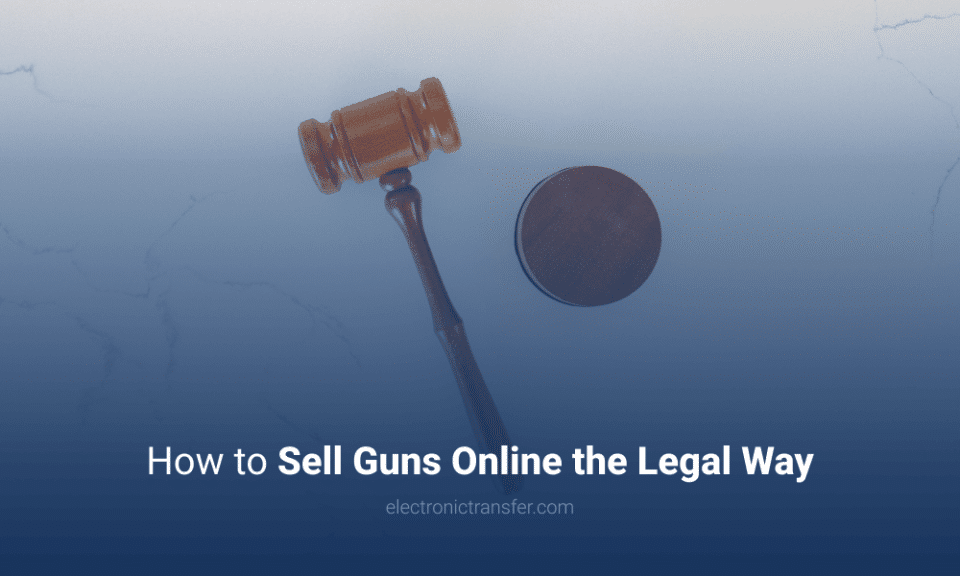How to Sell Guns Online the Legal Way
The gun business in the U.S. is growing incredibly fast. In 2022, it reached $80.73 billion, which is 332% higher than in 2008. At the same time, people are shifting their spending habits to online, meaning that eCommerce has become a promising way for small, independent gun sellers to reach more customers without the higher costs and limitations that come with owning a physical store.
With the right knowledge and planning, you can also sell firearms online to meet this new customer demand. It’s not as simple as selling socks though. You need to understand the laws, set up your website correctly, pay attention to many small details, find the right partners for shipping and payment processing, etc.s.
This article aims to make the process easier by helping you make informed decisions about offering guns online deals. Keep on reading!

Sell Guns Online: More Pros than Cons
While entering the eCommerce realm comes with its challenges, the potential rewards make it worthwhile for those willing to persevere. With a clear plan in hand, you can pave the way to a rewarding online business venture.
Advantages:
- Wider reach: Having an online shop means you’re not limited only to local customers within an hour’s drive. You can reach all kinds of people everywhere.
- Lower overhead costs: One significant advantage of an online gun shop is the reduced overhead costs compared to a traditional brick-and-mortar store.
- Competitive pricing: Without the costs of a physical store, you are more flexible and can offer better prices.
- Wider selection: An online shop can offer a broader range of gun products than a brick-and-mortar shop.
Disadvantages:
- Legal requirements: Online gun shops must adhere to legal regulations and requirements.
- Complicated logistics: Processing orders and shipping might create logistical issues if not executed right.
- Payment processing specifics: Many payment processors restrict firearms transactions, but fortunately there are specialized solutions for online sales.

How to Become an Online Gun Dealer?
Now, if you’re convinced that an online gun shop is your next business move, let’s see the main milestones you have to overcome.
1. Legal Requirements
There are three types of regulation you need to deal with: federal, state, and local.
The first goal is to obtain an FFL license. Online gun dealers, also known as Federal Firearms License (FFL) holders, are authorized by the Bureau of Alcohol, Tobacco, Firearms and Explosives (ATF). Take time to consult with legal experts of the ATF for guidance on specific requirements and processes.
State gun laws are published on the ATF website. These differ from state to state. For instance there might be different age requirements, or types of firearms that you can or cannot sell. Or, for example, in most states you cannot ship a firearm and ammo in the same shipment or sometimes, users are not allowed to buy a gun and ammo in the same cart, etc.
Once you’re licensed and registered, make sure that you display your licenses on your website since customers will most likely check if your business is properly authorized to engage with firearm sales.
2. Finding a Gun-Friendly Payment Processor
You want customers to be able to purchase guns online seamlessly so the next milestone is to find a gun-friendly payment processor like Electronic Transfer Inc. A gun-friendly payment processor is a merchant service provider that specializes in facilitating transactions for firearms businesses. They have in-depth knowledge of the legal and financial complexities involved with firearms transactions and offer services designed to address the unique challenges faced by businesses operating in this sector.
These companies are necessary because firearm businesses are labeled as “high risk” by many banks because of the elevated levels of potential financial risk or liability.
Basically, this means that you cannot rely on mainstream payment processors such as PayPal, Stripe, etc., for any firearm transactions. Most credit card processors prohibit gun sales, and even if you receive approval from such an entity, your account might be suddenly frozen or terminated.
3. Understanding the Shipping Process
After you’re legally cleared to sell guns online and a secured payment process is in place, it’s time to familiarize yourself with the shipping details.
Shipping From FFL to FFL
One specific aspect of gun eCommerce is that unlike other products, you can’t ship guns directly to a customer’s home. Instead, you need to ship to a local dealer with a valid Federal Firearms License. The dealer charges a small fee, paid by the customer, and conducts background checks, enforces waiting periods, and ensures all other legal requirements are met before handing over the gun to the customer.
Finding Carrier
Shipping through the U.S. Postal service is allowed under specific conditions but even in this case is difficult and time-consuming. It is better to rely on private carriers such as UPS or FedEx.
Creating a Stellar Online Gun Shop
It’s time to create a trustworthy and well functioning website. While seeking assistance from experienced professionals is highly advisable, there are two main aspects you must consider beforehand.
1. Choosing the Right Ecommerce Platform
You cannot sell guns through Etsy or Amazon, and platforms such as Shopify or Wix have specific requirements. Therefore, the most important decision is choosing an eCommerce platform that is firearm-friendly and can integrate with the necessary software and plugins for a smooth operation.
Here are a few gun-friendly platforms to consider:
- Woocommerce
- BigCommerce
- AmmoReady
- Make Ready Arms
- Sell Gun Online (SGO)
2. The Most Important Functionalities
FFL Functionality
Having FFL functionality on your website is crucial. In the past, shipments were often sent to dealers with an expired license or an inaccessible address, which caused logistical crises. Now, such information has been updated, and the client can automatically select by zip code which FFL dealer is closest to them.
Your website needs to accurately label products, identify the destination state for shipping, and dynamically adjust its functionality and information based on the relevant regulations in that state. This ensures legal compliance and a smooth user experience for customers across different locations.
For example, having automation software such as Spark Shipping that integrates with WooCommerce and supports the Federal Firearms License (FFL) Finder Plugin means you can provide FFL locations to your customers at checkout and then automatically split up the order so it can be sent to the FFL location of your customer’s choice.
Upsell/Crossell Functionalities
These functionalities will allow you to sell more than just guns or ammo as well. For instance, you could offer an additional warranty, shipping insurance (upsell), or products typically used with firearms (cross sell).
Inventory Management System
An integrated inventory management system lets you collaborate with numerous vendors, maintain real-time inventory updates, synchronize product catalogs, and automate state-specific regulatory requirements for nationwide sales.
Age Verification Tool
Despite the convenience of online gun sales, proper processes must still be followed. This means ensuring you have the right tools to conduct background checks or verify the age of the individuals purchasing.

Secure Payment Gateways and Data Protection
People want to feel confident that their personal data is secure when shopping online. If your online gun shop is new, you’ll need to take extra measures to ensure the personal data of your buyers is safe and that their payments are processed safely, securely, and efficiently.
Two key aspects to keep in mind:
- Encryption: Encrypt all data as well as payment gateways so that you are protected against cybercriminals.
- Compliance: Follow all applicable laws. Use secure payment gateways to verify buyers and transactions.
The Importance of Branding and Customer Trust
Establishing a strong brand and building trust with your audience is essential in the firearms eCommerce space. Customers want to know they’re dealing with a reputable, professional seller, especially in a highly regulated industry. Create clear, transparent policies regarding returns, warranties, and compliance to instill confidence.
Engaging with customers through educational content, such as blog posts or videos on firearm safety and maintenance, can also set your business apart. Finally, encourage satisfied customers to leave reviews, as positive testimonials can significantly influence future buyers and help strengthen your brand’s credibility.
Wrap Up
Starting an online gun shop requires navigating legal requirements, finding gun-friendly payment processors, understanding shipping processes, and creating a secure website.
While this may not be an easy task, by following these key steps, you can tap into the growing eCommerce firearms market and provide an effortless gun purchasing experience for your customers.
If you need any help, guidance, or assistance during this process, give us a call and we will be happy to lend you a hand!


